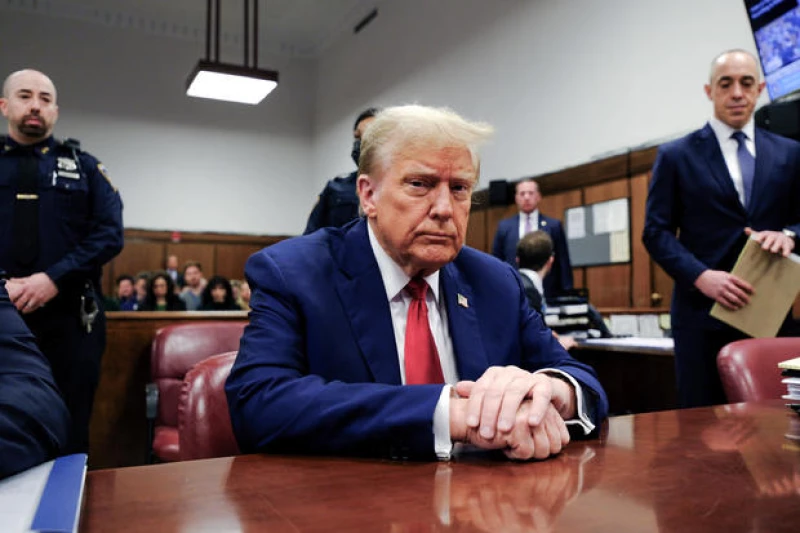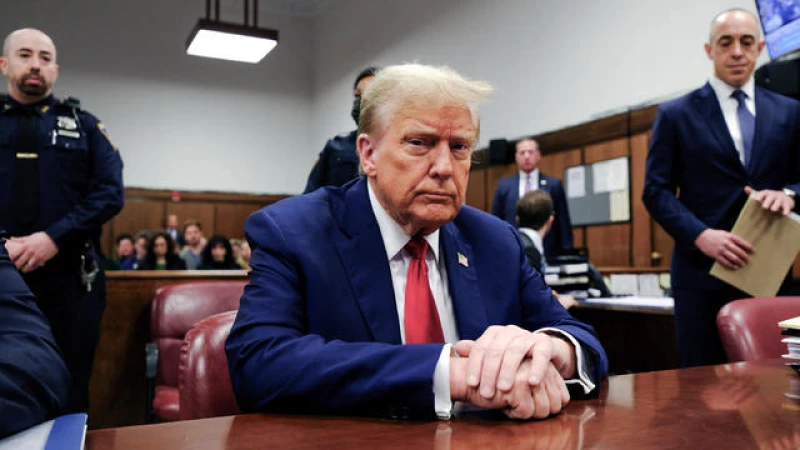Each day in his New York criminal trial, all eyes are on Donald Trump as he and his team enter the courtroom.
Before their arrival, everyone but the judge and jurors are already seated. Reporters, members of the public, prosecutors, and Manhattan District Attorney Alvin Bragg must pass through security screening and be in place, maintaining silence as Trump approaches.
As Trump's motorcade approaches the 17-story Art Deco-style building, the group is settled in, waiting. The court officers' radios crackle, the sound bouncing off the high, aged ceilings, signaling the arrival of the former president.

Reporters are warned that any phone usage will result in removal from the room. Despite the caution, the room is filled with the clatter of laptops, a sea of glowing screens displaying notes, emails, messages, and social media updates.
Outside the room, Trump rages about Bragg, Judge Juan Merchan and the case. The former president is being tried on 34 felony counts of falsifying business records related to an alleged "hush money" payment before the 2016 presidential election. He denies the allegations and has entered a not guilty plea.
Once Trump walks through the thick wooden double doors — sometimes setting a brisk pace, sometimes lumbering, always stone-faced — his demeanor changes. He's accompanied by a team of lawyers, usually campaign staff, too, and of course Secret Service agents, who move to the perimeter after Trump takes a seat at the defense table.
Inside the room, he's reserved, quiet. Sometimes he appears to briefly nod off. He occasionally whispers with attorneys Todd Blanche, Susan Necheles and Emil Bove.
He stands at attention when Merchan enters the room, and like everyone else, sits only when told he may.
During jury selection, he sometimes craned his neck to the right to watch New Yorkers in the jury pool as they were questioned about their social media habits and their feelings about Trump. He afforded Blanche the same attention during his opening statement Tuesday.
Primarily, Trump gazes straight ahead. But what exactly is he looking at? Is it the computer monitor he shares with the attorney beside him? Perhaps at times. However, his gaze seems to extend beyond that, past the busy judge's clerk, whose desk offers a prime view second only to Merchan's. Is he fixated on the wall? The lower portion of the wall is adorned with wood paneling, while the rest is painted a solid white. Additionally, mounted on the wall opposite Trump is a flat-screen television, one of four in the room. At all times, it displays Merchan, the attorneys, and Trump himself.
This has been Trump's demeanor throughout most of the proceedings—not just during the initial six days of the trial, but also during pretrial hearings since his arraignment on April 4, 2023. He was cautioned once last week about potential juror intimidation, following gestures and head-shaking while a former juror was being questioned, but otherwise, he has remained composed.
Contrast Trump's conduct in this courtroom with the visible and audible expressions of displeasure that disrupted recent trials.
During a January defamation trial in the civil case filed by writer E. Jean Carroll, Trump's repeated outbursts prompted a federal judge to threaten his removal from the courtroom.
In that instance, Trump's audible groans could be heard from the gallery during testimonies, and an opposing attorney noted that he frequently made remarks like, "It's a witch hunt," and, "it's really a con job."
The judge remarked, "Mr. Trump has the right to be present here. However, this right can be forfeited if he disrupts proceedings and disregards court orders."
During another recent civil trial, a New York case in which he and others from his company were found liable for hundreds of millions of dollars in fraudulent profits, Trump often seemed uncontrollable. Lawyers in the office of New York Attorney General Letitia James accused him of witness intimidation one day as his whispers during a real estate executive's testimony turned toward loud rasps — his head bobbing from side to side, shaking in apparent disparagement.
The circumstances of those civil trials were different. Trump was not required to be present, and could come and go as he pleased — occasionally standing and leaving without warning, his Secret Service entourage scrambling to keep up. The judge in the defamation trial interrupted Carroll's closing argument to note that Trump had gotten up and walked out. He returned for his lawyer's closing, and then later exited the courthouse for good about 30 minutes before the jury announced its $83.3 million judgment against him.
Now, Trump is a criminal defendant. He's required to attend the whole trial, and to sit quietly unless expressly granted permission to do otherwise.
He sought permission to spend Thursday morning in Washington, D.C., watching arguments before the Supreme Court in a matter related to another of his criminal cases. Merchan denied that request.
He asked to adjourn the trial for one day in May to attend his son's graduation. One of his lawyers made a similar request for a day in June. Merchan said maybe, tacitly hitting at the many attempts Trump's team has made to delay the trial.
"If everything is going according to schedule without unnecessary delays, then I am sure we will be able to adjourn for one or both of those days, but if we are running behind schedule, we will not be able to," Merchan said.
"I would rather be real cold than sweating," Merchan said.
Trump must rise when Merchan or the jury enters and exits, like thousands of other defendants who have sat in the same seat.
Once, as proceedings were wrapping up on Friday, April 19, Trump rose just a bit too early.
"Sir, can you please have a seat," Merchan told him. The judge decides when the defendant can leave his courtroom.
But if Merchan is top dog in his courtroom, there's no mistaking who's next in the hierarchy. Trump gets up and walks out with his crew in tow. He hands his phone to an aide. The heavy wooden doors close again. He's back in the hallway defending himself in front of the waiting cameras.
As the tension filled the room, everyone waited in silence for the radio crackles to signal that the area was clear. No one dared to stand up until then, and reporters were cautioned to keep their voices down.
The minutes seemed to stretch on endlessly on Monday, both during and after Trump's hallway speech. Bragg and his team of prosecutors attempted to make a discreet exit through a side door usually reserved for courtroom staff. However, they soon reappeared, visibly frustrated and annoyed, unable to leave.
Finally, the awaited signal came over the radio. With his head down, Bragg swiftly made his way out through the same side door. The room was then given permission to disperse.
And just like that, Trump had left the building.







